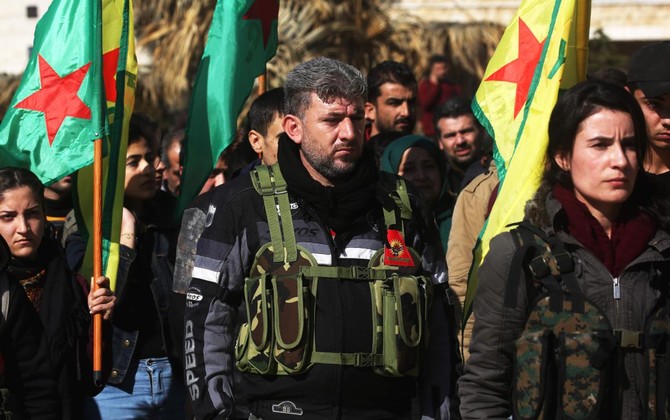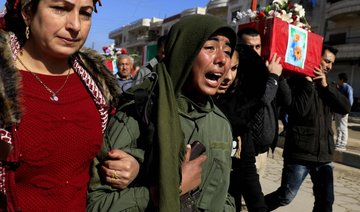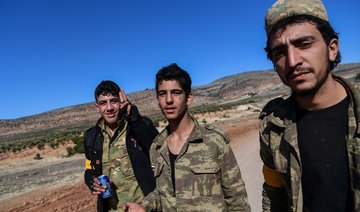ALEPPO, Syria/BEIRUT: Syria’s US-backed Kurds are getting indirect help from an unlikely source in their war against Turkey in the northwestern region of Afrin: President Bashar Assad.
Pro-government forces and Kurdish-led forces have fought each other elsewhere in Syria and Damascus opposes the Kurds’ demands for autonomy. But in Afrin they have a common enemy and a mutual interest in blocking Turkish advances.
Turkey, which regards the Kurdish YPG militia in Afrin as a threat on its southern border, launched an assault on the region last month. Seeking to shield Afrin, the Kurds asked Damascus to send forces into action to defend the border.
The government shows no sign of doing so, but it is providing indirect help by allowing Kurdish fighters, civilians and politicians to reach Afrin through territory it holds, representatives of both sides told Reuters.
Assad stands to gain while doing little.
The arrival of reinforcements is likely to sustain Kurdish resistance, bog down the Turkish forces and prolong a conflict that is sapping the resources of military powers that rival him for control of Syrian territory.
For the United States, it is yet another complication in Syria’s seven-year-old war, and a reminder of how its Syrian Kurdish ally must at times make deals with Assad even as it builds military ties with the United States.
Lacking international protection, the Kurdish-led forces in northern Syria say they have reached agreements with Damascus to allow reinforcements to be sent to Afrin from other Kurdish-dominated areas — Kobani and the Jazeera region.
“There are different ways to get reinforcements to Afrin but the fundamental route is via regime forces. There are understandings between the two forces ... for the sake of delivering reinforcements to Afrin,” Kino Gabriel, spokesman for the Kurdish-dominated Syrian Democratic Forces (SDF), said.
While the Kurds depend on Assad to reach Afrin, Kurdish sources say they also enjoy leverage over Damascus because it needs their cooperation to source grain and oil from areas of the northeast under Kurdish control.
A commander in the military alliance fighting in support of Assad said “the Kurds have no option but coordination with the regime” to defend Afrin.
“The Syrian regime is helping the Kurds with humanitarian support and some logistics, like turning a blind eye and allowing Kurdish support to reach some fronts,” said the commander, who spoke on condition of anonymity.
Turkish campaign moves slowly
The Turkish military is making slow gains nearly three weeks into the operation it calls “Olive Branch.”
Ankara views the YPG as an extension of the Kurdistan Workers’ Party (PKK), which has fought a three-decade insurgency in Turkey and is regarded as a terrorist group by the United States and the European Union.
The United States has relied on the YPG as a vital ground component of its war against Daesh, and has backed the group in other Kurdish-run regions in northern Syria along the border with Turkey.
But US forces are not in Afrin, so have been unable to shield Afrin from the attack by Turkey, its NATO ally.
The Kurds meanwhile accuse Russia of giving a green light for the Turkish attack by withdrawing observers it deployed in Afrin last year.
The Afrin war marks another twist in the complicated story of relations between Assad and the Syrian Kurdish groups, spearheaded by the YPG, that have carved out autonomous regions in northern Syria since the war began in 2011.
The YPG controls nearly all of Syria’s frontier with Turkey. But Afrin is separated from the bigger Kurdish-controlled region further east by a 100 km-wide zone controlled by the Turkish military and its Syrian militia allies.
For much of the war, Damascus and the YPG have avoided confrontation, at times fighting common enemies, including the rebel groups that are now helping Turkey attack Afrin.
But tensions have mounted in recent months, with Damascus threatening to march into parts of eastern and northern Syria captured by the SDF with support from the US-led coalition.
Underlining that, pro-Syrian government forces attacked the SDF in the eastern province of Deir Ezzor, drawing coalition air strikes overnight that killed more than 100 of the attackers, the coalition said.
“The regime has allowed the YPG to bring people into Afrin, while attacking it east of Euphrates (River). I think that is indicative of the state of relations right,” said Noah Bonsey, International Crisis Group’s Senior Analyst on Syria.
He added: “There is still a significant gap between the YPG and regime positions on the future of northeastern Syria.”
Fighting for Afrin
The main Syrian Kurdish groups remain wedded to their vision of a Syria where they enjoy autonomy in a form of federalism that is at odds with Assad’s determination to recover all Syria.
Each side has allowed the other to maintain footholds in its territory. In Kurdish-held Qamishli, the government still controls the airport. In the Sheikh Maqsoud district of Aleppo, a government city, Kurdish security forces patrol the streets.
Scores of Kurds from Sheikh Maqsoud have gone to Afrin to support the fight, Kurdish officials there said. The short journey requires movement through areas held by the government or its Iran-backed Shiite militia allies.
“Of course people went from Sheikh Maqsoud — in the hundreds — to bear arms and defend Afrin,” said Badran Himo, a Kurdish official from Sheikh Maqsoud.
“Around 10 of them were martyred (killed),” he told Reuters as Kurdish security forces held a rally to commemorate one of the dead.
Earlier this week, witnesses say a civilian convoy of hundreds of cars drove to Afrin from other Kurdish-held areas in a show of solidarity.
The Syrian government has ignored appeals by the Kurdish authorities to guard the Syrian border at Afrin.
“We tried to convince them, via the Russians, to at least protect the borders, to take a position, but we did not reach (get?) a result,” Aldar Khalil, a top Kurdish politician, told Reuters.
“If they don’t protect the borders, then at least they don’t have the right to block the way for Syrian patriots who are protecting these borders, regardless of other domestic issues.”
Friend or foe? Assad quietly aids Syrian Kurds against Turkey
Friend or foe? Assad quietly aids Syrian Kurds against Turkey

UN chief condemns ‘escalation’ between Yemen’s Houthis and Israel

- UN Secretary-General Antonio Guterres calls Israeli strikes on Sanaa airport ‘especially alarming’
NEW YORK: The UN chief on Thursday denounced the “escalation” in hostilities between Yemen’s Houthi militias and Israel, terming strikes on the Sanaa airport “especially alarming.”
“The Secretary-General condemns the escalation between Yemen and Israel. Israeli airstrikes today on Sana’a International Airport, the Red Sea ports and power stations in Yemen are especially alarming,” said a spokesperson for UN Secretary-General Antonio Guterres in a statement.
Israeli air strikes pummeled Sanaa’s international airport and other targets in Yemen on Thursday, with Houthi militia media reporting six deaths.
The attack came a day after the Houthis fired a missile and two drones at Israel.
World Health Organization chief Tedros Adhanom Ghebreyesus said on social media he was at the airport during the strike, with the UN saying that a member of its air crew was injured.
The United Nations put the death toll from the airport strikes at three, with “dozens more injured.”
UN chief Guterres expressed particular alarm at the threat that bombing transportation infrastructure posed to humanitarian aid operations in Yemen, where 80 percent of the population is dependent on aid.
“The Secretary-General remains deeply concerned about the risk of further escalation in the region and reiterates his call for all parties concerned to cease all military actions and exercise utmost restraint,” he said.
“He also warns that airstrikes on Red Sea ports and Sana’a airport pose grave risks to humanitarian operations at a time when millions of people are in need of life-saving assistance.”
The UN chief condemned the Houthi militias for “a year of escalatory actions... in the Red Sea and the region that threaten civilians, regional stability and freedom of maritime navigation.”
The Houthis are part of Iran’s “axis of resistance” alliance against Israel.
Bodies of about 100 Kurdish women, children found in Iraq mass grave

TAL AL-SHAIKHIA, Iraq: Iraqi authorities are working to exhume the remains of around 100 Kurdish women and children thought to have been killed in the 1980s under former Iraqi ruler Saddam Hussein, three officials said.
The grave was discovered in Tal Al-Shaikhia in the Muthanna province in southern Iraq, about 15-20 kilometers (10-12 miles) from the main road there, an AFP journalist said.
Specialized teams began exhuming the grave earlier this month after it was initially discovered in 2019, said Diaa Karim, the head of the Iraqi authority for mass graves, adding that it is the second such grave to be uncovered at the site.
“After removing the first layer of soil and the remains appearing clearly, it was discovered that they all belonged to women and children dressed in Kurdish springtime clothes,” Karim told AFP on Wednesday.
He added that they likely came from Kalar in the northern Sulaimaniyah province, part of what is now Iraq’s autonomous Kurdistan region, estimating that there were “no less than 100” people buried in the grave.
Efforts to exhume all the bodies are ongoing, he said, adding that the numbers could change.
Following Iraq’s deadly war with Iran in the 1980s, Saddam’s government carried out the ruthless “Anfal Operation” between 1987 and 1988 in which it is thought to have killed around 180,000 Kurds.
Saddam was toppled in 2003 following a US-led invasion of Iraq and was hanged three years later, putting an end to Iraqi proceedings against him on charges of genocide over the Anfal campaign.
Karim said a large number of the victims found in the grave “were executed here with live shots to the head fired at short range.”
He suggested some of them may have been “buried alive” as there was no evidence of bullets in their remains.
Ahmed Qusai, the head of the excavation team for mass graves in Iraq, meanwhile pointed to “difficulties we are facing at this grave because the remains have become entangled as some of the mothers were holding their infants” when they were killed.
Durgham Kamel, part of the authority for exhuming mass graves, said another mass grave was found at the same time that they began exhuming the one at Tal Al-Shaikhia.
He said the burial site was located near the notorious Nugrat Al-Salman prison where Saddam’s authorities held dissidents.
The Iraqi government estimates that about 1.3 million people disappeared between 1980 and 1990 as a result of atrocities and other rights violations committed under Saddam.
Brother of suspected ‘terrorist’ stabs Tunisia National Guard officer

TUNIS: The brother of a suspected “terrorist” on Thursday stabbed a Tunisian National Guard officer in the eastern Monastir governorate, a judicial source told AFP.
Earlier in the day, a National Guard unit attempted to arrest the suspect — accused by authorities of being a member of a “terrorist group” — at his home, said the source, speaking on condition of anonymity.
During the arrest operation, his brother attacked the officer, the source added.
The source said the officer was hospitalized following the stabbing in his abdomen and was recovering after undergoing surgery.
An investigation was opened by the judicial division combatting terrorism, the source added.
Neither of the brothers, both of whom were taken into police custody, have been named, and the Tunisian interior ministry did not respond to AFP’s request for comment.
Tunisia saw a surge in jihadist groups after the 2011 revolution that overthrew the dictatorship of Zine El Abidine Ben Ali.
Attacks claimed by jihadists in recent years have killed dozens of soldiers and police officers, as well as some civilians and foreign tourists.
Jihadist attacks in Sousse and the capital Tunis in 2015 killed dozens of tourists and police, but authorities say they have since made significant progress against extremism.
Palestinian hospital director says Israeli strike kills 5 staff in Gaza

- WHO has described conditions at Kamal Adwan hospital as “appalling” and said it was operating at a “minimum” level
GAZA STRIP: Five staff at one of northern Gaza’s last functioning hospitals were killed by an Israeli strike on Thursday, the facility’s director said, more than two months into an Israeli operation in the area.
Hossam Abu Safiya, head of the Kamal Adwan hospital in Beit Lahia, said “an Israeli strike resulted in five martyrs among the hospital staff.” The Israeli military did not immediately respond to a request for comment.
Israel has been pressing a major offensive in northern Gaza since October 6, saying it aims to prevent Hamas militants from regrouping.
At the other end of the Palestinian territory, the chief paediatric doctor at the Nasser Hospital in Khan Yunis said three babies had died from a “severe temperature drop” this week as winter cold sets in.
Doctor Ahmed Al-Farra said the most recent case was a three-week-old girl who was “brought to the emergency room with a severe temperature drop, which led to her death.”
A three-day-old baby and another “less than a month old” died on Tuesday, he said.
Meanwhile, in central Gaza, a Palestinian TV channel affiliated with a militant group said five of its journalists were killed on Thursday in an Israeli strike on their vehicle in Gaza, with Israel’s military saying it had targeted a “terrorist cell.”
Witnesses said a missile struck the van while it was parked outside Al-Awda Hospital in Nuseirat.
The three-week-old girl, Sila Al-Faseeh, was living in a tent in Al-Mawasi, an area designated a humanitarian safe zone by the Israeli military that is home to huge numbers of displaced Palestinians.
“The tents do not protect from the cold, and it gets very cold at night, with no way to keep warm,” said Farra.
He said many mothers were suffering from malnutrition which affected the quality of their breast milk and compounded the risks to newborns.
Sila’s father Mahmoud Al-Faseeh said it was “extremely cold, and the tent is not suitable for living. The children are always sick.”
The United Nations and other organizations have repeatedly decried the worsening humanitarian conditions in Gaza, particularly in the north, since Israel began its latest military offensive in early October.
The World Health Organization has described conditions at Kamal Adwan hospital as “appalling” and said it was operating at a “minimum” level.
Earlier on Thursday, Gaza’s civil defense agency said that five other people had been killed by Israeli strikes during the day in the north of Gaza.
Meanwhile, the Israeli military said a 35-year-old soldier was killed in the central Gaza Strip. It brings to 390 the number of Israeli soldiers killed since the start of ground operations in the Palestinian territory.
The journalists’ employer Al-Quds Today said in a statement that a missile hit their broadcast van while it was parked in the Nuseirat refugee camp in central Gaza.
The channel is affiliated with Islamic Jihad, whose militants have fought alongside Hamas in the Gaza Strip and took part in the October 7, 2023 attack on Israel that sparked the war.
The station identified the five staffers as Faisal Abu Al-Qumsan, Ayman Al-Jadi, Ibrahim Al-Sheikh Khalil, Fadi Hassouna and Mohammed Al-Ladaa.
They were killed “while performing their journalistic and humanitarian duty,” the statement said.
The Israeli military said it had conducted a “precise strike” and that those killed “were Islamic Jihad operatives posing as journalists.”
The Committee to Protect Journalists’ Middle East arm said in a statement it was “devastated by the reports.”
“Journalists are civilians and must always be protected,” it added.
The Palestinian Journalists Syndicate said last week that more than 190 journalists had been killed and at least 400 injured since the start of the war in Gaza.
The war was triggered by the Hamas-led October 7 attack last year, which resulted in 1,208 deaths, mostly civilians, according to an AFP tally of Israeli official figures.
Israel’s retaliatory military campaign has killed at least 45,399 people in Gaza, a majority of them civilians, according to figures from the Hamas-run territory’s health ministry that the UN considers reliable.
Israeli attorney general orders probe into report that alleged Netanyahu’s wife harassed opponents

- Program uncovered a trove of WhatsApp messages in which Mrs. Netanyahu appears to instruct a former aide to organize protests against political opponents
JERUSALEM: Israel’s attorney general has ordered police to open an investigation into Prime Minister Benjamin Netanyahu’s wife on suspicion of harassing political opponents and witnesses in the Israeli leader’s corruption trial.
The Israeli Justice Ministry made the announcement in a terse message late Thursday, saying the investigation would focus on the findings of a recent report by the “Uvda” investigative program into Sara Netanyahu.
The program uncovered a trove of WhatsApp messages in which Mrs. Netanyahu appears to instruct a former aide to organize protests against political opponents and to intimidate Hadas Klein, a key witness in the trial.
The announcement did not mention Mrs. Netanyahu by name, and the Justice Ministry declined further comment.
But in a video released earlier Thursday, Netanyahu listed what he said were the many kind and charitable acts by his wife and blasted the Uvda report as “lies.”
It was the latest in a long line of legal troubles for the Netanyahus — highlighted by the prime minister's ongoing corruption trial.
Netanyahu is charged with fraud, breach of trust and accepting bribes in a series of cases alleging he exchanged favors with powerful media moguls and wealthy associates. Netanyahu denies the charges and says he is the victim of a “witch hunt” by overzealous prosecutors, police and the media.





















